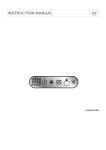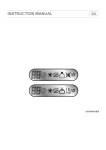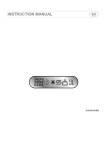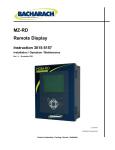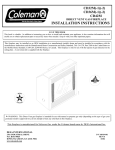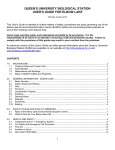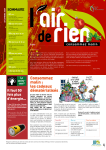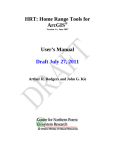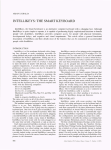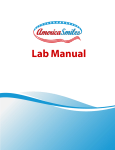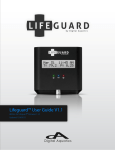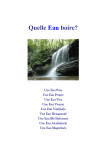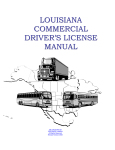Download QUEEN'S UNIVERSITY BIOLOGICAL STATION USER GUIDE FOR
Transcript
QUEEN'S UNIVERSITY BIOLOGICAL STATION USER GUIDE FOR FIELD COURSE PARTICIPANTS This User Guide is intended to outline matters of safety, QUBS procedures and policy governing use of the field station. Users must read this guide and understand its provisions. This is not a trivial matter since all QUBS users must co-operate in ensuring a safe and productive facility. All users will be required to sign a form acknowledging receiving, reading and abiding by the provisions of this guide. QUBS Website This guide and general in formation is also available at http://biology.queensu.ca/~qubs. History Queen's Universit y Biological Station (QUBS) was established in 1945 when Dr. Wes Curran purchased the point on Lake Opinicon from the Acton family on behal f o f the Universit y. Some o f the buildings on site were erected in the period 1946-1948, notably the boathouse, Trilab and the "Bunkie Junior" cabins. De velopment has continued since that time, producing a field station facilit y o f some 30+ buildings - living accommodations, food service space, labs, library, aquarium, computing equipment etc. In spring 2000, the new Operations Centre was completed, replacing the old lodge as our central services building. A number o f propert y acquisitions have also taken place: Sheep Island (1950), Hughson Tract (1976), expansion o f the main QUBS site by purchase from the Curtis family (1985), Sk ycroft Tract (1986), Eastern half o f Cow Island (1988), Cape-Sauriol Environmental Studies Area (1989), Pangman Conservation Reserve (1994), Bracken Tract (1994), Moores Tract (1995), Crabbe Propert y (1999), Massassaugua Road Propert y (2001 - 2003), Boston Wildlands (2004) and reid Propert y (2008). Presently, QUBS owns some 2,770 hectares (about 6,843 acres) o f land. The Biological Station provides qualit y li ving and laboratory facilities close to field study sites for teaching and research in field biology. The QUBS mandate is to provide qualit y opportunities for teaching and research in biology and the environmental sciences. QUBS facilitates both teaching and research by providing the logistical support for these acti vities. Originally a teaching facilit y, QUBS has increased its research acti vities since the fi fties. Both education and research are important mandates o f QUBS. Currently, involvement with the Ontario Universities Program in Field Biology and research programs o f researchers from a wide variet y o f institutions makes QUBS a vital, interesting site for field biology. In addition, QUBS of fers its own programming, in the past, the Naturalists' Workshop and currentl y hosts a variet y o f field trips and small conferences each year. Queen's Universit y provides the financial support for the Biological Station and its operation. In addition, the station is the recipient o f a Major Facilities Access grant from NSERC. This grant enables research use o f the field station by non-Queen's people. In the past few years, researchers from many Canadian universities, as well as international researchers, have conducted studies at QUBS. This diversit y o f users contributes to a healthy atmosphere o f inquiry into an wide array o f research topics. Administration QUBS is administered as part o f the Department o f Biology, Queen's Universit y. The cascade of responsibilit y for operations is as follows: Dean, Arts and Science; Chairman, Department o f Biology; QUBS Director, Dr. Bruce Tufts; QUBS Manager/Senior Instructor, Mr. Frank Phelan; QUBS Assistant Manager, Mr. Floyd Connor. The Director and Manager are responsible for day-to-day operation o f the facilit y and collaborate on planning, reservations and all aspects of general operations. Accounting is handled by Julie French (Admin. Asst.) and Mr. John Topping, Departmental Manager, Department o f Biology. Arrival at QUBS Immediately upon arrival at QUBS, contact the Manager. He, or his designate will show you to accommodations/lab space/equipment allocated for y our use. A copy o f the QUBS User Guide will be issued. Familiarize yoursel f with the guide and keep it handy for reference during your stay. The Manager or his designate check arriving students with course lists. Advise QUBS management o f special medical conditions as soon as possible after arrival. A check will also be made to ensure that students have paid deposits for field courses to their home universit y. Outstanding balances o f field course costs will also be collected. Map of Main Site A map detailing the area comprising the main site at QUBS is included in the user guide folder. Health and Safety The foremost concern o f QUBS sta f f is the maintenance of a healthy and safe living/working environment at the field station. QUBS users must abide by the sa fet y guidelines outlined herein and do everything in their power to assist sta f f with health and safet y matters. Field work does entail some risk. Students must be advised of such risks and course instructors must develop plans to minimize the risks o f field work, in compliance with Queen's O f f-Campus Acti vity Sa fet y Polic y http://www.safety.queensu.ca/policy/activity . QUBS safet y o f ficer is the Manager, Mr. Frank Phelan. 911 Emergency System QUBS is serviced by the 911 emergenc y s ystem. Dialling 911 gives access to fire, ambulance and police services. In conjunction with the 911 s ystem, a municipal addressing s ystem has been put into place. If you call 911, you will need to report the municipal address for QUBS: QUBS Municipal Address: 280 Queen's University Road, Township of Rideau Lakes, South Crosby Ward (about 1 mile west o f Cha f fe y's Lock o f f the Opinicon Road) Emergency Fire Procedure Upon detection o f a fire, prime concern is for personal safet y. Immediately e vacuate the building af fected. Proceed to nearest exit, shouting "FIRE, FIRE, FIRE". Make sure everyone is out o f the building. Ring the alarm bell outside the operations centre and continue ringing to alert all station users (the operations centre has automatic alarms in case of fire in that building). Noti f y QUBS management immediately and call the local Fire Department using 911 (or 359-5678) i f requested to do so (Emergency numbers are posted at each phone). Assemble in the open area immediately in front o f the operations centre for head count and further instructions. Field course instructors should always know the whereabouts o f their students and should assist QUBS sta f f in accounting for everyone. QUBS is provided with smoke detectors (and Carbon Monoxide detectors) in major accommodations, an alarm s ystem in the operations centre and fire extinguishers in all buildings. Familiarize yoursel f with the warning devices, extinguishers and exits in your living/workspace. However, it is not expected that QUBS users be firefighters. IF the fire is a minor one (a fire less than 1 m3) and IF you know how to use an adjacent fire extinguisher and IF you have an exit at your back and IF you are sure you can extinguish the fire, then DO SO. I f you have ANY doubts, commence emergency fire procedures as outlined above. Propert y can be replaced, lives cannot. DO NOT TAKE CHANCES. QUBS has a portable fire pump for fire fighting and sta f f are trained in its use. This will be used when practicable to contain fires until the arrival of the local fire department. Fire Safety Fire protection equipment is provided in all li ving/workspaces. Equipment is routinely inspected. However, i f you should notice de fects or missing equipment, noti f y QUBS sta f f at once. Fireplaces are provided in several buildings at QUBS. Treat all fires in fireplaces with extreme caution. NEVER leave a fire unattended. ALWAYS use the fire screen. Outdoor fires ma y be permitted IF conditions are suitable. Outdoor fires will not be permitted under windy or dry conditions or when outdoor burning bans are in place or when such acti vit y interferes with work/sleep schedules o f QUBS residents. Smoking For health and sa fet y reasons, Queen's Universit y is a smoke-free workplace. At QUBS, there will be no smoking inside ANY building. For sa fet y reasons, there will also be no smoking in boats, station vehicles or in the vicinit y o f the boathouse and gas shed. Smoking must be done out-o f-doors. When smoking out-of-doors, be care ful not to create a fire hazard in the woods. Do not dispose o f butts on the grounds. Meals Meals are served bu f fet-st yle in the operations centre. Station users are expected to bus their own dishes. Normal meal hours are: Break fast 0730-0830; Lunch 1200-1300; Dinner 1730-1830. The bell outside the operations centre will toll to announce the start o f meal hours. Meals will not be served at other hours unless speci fied by QUBS management. On Sundays, brunch ma y be served. When scheduled, brunch will run from 0900-1200. Meals are prepared with the provision of a balanced, healthy diet in mind. Normally, vegetarian meals are interspersed with the regular menu. Alternatives to meats are generally a vailable for strict vegetarians. I f an individual user requires or desires specialized foods, they will have to provide these on their own. For field work, a box lunch is available. 24 hr. notice is to be given to kitchen sta f f for box lunches. Kitchen and food storage areas are off-limits for QUBS users. Do not remove equipment from the kitchen. Do not help yoursel f to foodstuf f s in fridges or freezers. Snacks will be placed on serving counter or out in the servery. Co f fee/tea are always a vailable. For early risers, space will be designated for early breakfast food. Notify kitchen staff of food allergies, special diet conditions etc. Keep food and beverage counters clean. Suggestions for menus are always welcome. Drinking Water Safe drinking water (UV sterilized) from a well is provided only to the operations centre and the White House. All other cottages and labs are supplied with untreated water directly from the lake or untested well. During the bus y season, the well supply is tested weekly for contaminants. Lake water (or untested well water) is suitable for washing and showering, not for drinking. Blue jugs in the kitchens o f cottages contain drinking water. Fill these at the operations centre or White House or noti f y QUBS sta f f as required. Disposal Water-borne disposal (toilets, sinks, showers) in living accommodations ends up in septic s ystems. These s ystems need to be treated gently. Unlike municipal water s ystems, care must be taken with septic s ystems. Do not dispose o f non-biodegradable material in toilets (no plastic). Do not dispose o f paper towels or cardboard in toilets. Do not attempt to f lush bulk y items. No chemicals to be disposed o f in sinks or toilets. Solid waste should be placed in appropriate containers (using clear plastic bags). Animal material should not be placed with garbage. Consult management re burial or alternate disposal. Take care to safely package material which may pose a handling hazard (eg. broken glass, razor blades, pipettes etc.). Do not dispose of chemicals in garbage. A wide variet y o f materials is locally rec yclable. QUBS acti vel y participates in these programs and encourages all users to co-operate in this e f fort. A rec ycling shed is located near the workshop. Compost containers are found in the operations centre. Please deposit non-animal food scraps for composting. This is a good way to reduce the volume o f waste destined for land fill sites and produces an ecologically valuable-end-product. Housekeeping QUBS sta f f attempt to keep common areas clean and tidy. However, housekeeping in individual accommodations and laboratories is the responsibilit y o f the user. In multiple-user accommodations (eg. Curran Cottage), a committee of users should co-operate in keeping common areas clean and tidy. In areas such as the White House which has general-use bathrooms and common areas, the residents have primary responsibilit y for housekeeping which is supplemented b y QUBS sta f f as necessary. These arrangements are necessary since QUBS does not have the sta f f required to routinely perform these tasks. Also, costs o f housekeeping would undoubtedly be passed on to the user. Your co-operation helps keep costs low. Simple things like removing outdoor footwear at entrances, care fully wiping your feet and mopping up spills as they happen will greatl y assist with keeping QUBS buildings clean and tidy. . In the Operations Centre, it is best to keep a pair o f indoor shoes for use exclusively inside the building. In general, users will consistentl y assist with housekeeping by applying the rule o f thumb, "Leave it at least as clean as you found it". Swimming Swimming areas at QUBS are unprotected areas. There is no li feguard provided. Swimming is entirely at your own risk. Do not swim alone, a fter dark or while impaired. There are two swimming areas used at QUBS. Di f ferent levels o f swimming abilit y are required for each area. Keast's beach is ideal for children under adult supervision and for poor swimmers. Use o f the beach area is sometimes restricted so as to not interfere with ongoing research projects on nesting fish. The diving board area, with its deep water, should not be used by other than competent swimmers. Safet y equipment in the form o f throw rings and ropes are placed by swimming areas. Do not remove or play with sa fet y equipment. Be advised that the area o f f the diving board is a channel heavil y used by boat traf fic. It is dangerous to swim far out from shore or back and forth across this channel. There are inherent dangers in recreational swimming. Be safe. Recognize the hazards. Boating QUBS owns and maintains a fleet o f boats. These are NOT for general use. Rather, they are leased to investigators as research tools. Boats are fundamental research tools to field researchers. In addition, they are expensive tools and in inexperienced hands, very dangerous. Recreational Use: QUBS canoes may be available for recreational use. Users must be familiar with boating safet y and use of canoes. Canoes require the following basic sa fet y equipment: a li fejacket for each person (li fejackets must be worn), paddles, 15 m o f buoyant heaving line, a bailer and a soundsignalling device (whistle). Be sure that these are in the canoe each and every time it is used..Canoes belonging to the station must be signed out. Do not use private canoes without the permission o f the owner. Always let someone know where you are going and when you expect to return Teaching Use: Special care must be taken when operating boats for teaching purposes. Operators must be trained in boat sa fet y and operation and must have a Pleasure Cra ft Operator Card. New Transport Canada regulations class our pontoon boats as small commercial vessels and strict standards, including special sa fet y requirements come into play for these boats. QUBS pontoon boats must not exceed 11 passengers (including the driver). Operators must have proof o f competenc y to the MED A3 level. PFD’s will be worn by all passengers. Small vessel li fejackets are also carried on the pontoon boats at all times. Large cra ft with many passengers are di f ficult to handle and require practice and good judgement. When unskilled users are involved, QUBS sta f f will pilot boats for teaching purposes. Operation o f boats requires special caution. There are many hazards in Lake Opinicon, especially drowned lands and Rideau Canal tra f fic. Operators are responsible for their actions and the minimum sa fet y equipment. Misuse, abuse or dangerous operation of any QUBS boat will not be permitted. Accident or Injury Field course instructors are responsible for ensuring sa fe working conditions for their students. QUBS management MUST be noti fied immediately o f ANY accident or injury sustained while on Queen's Propert y. The Manager can assist with accident reporting (Institutional and WSIB). First aid and transport for medical attention can also be arranged by the Manager. In serious instances, do not wait for the Manager, call an ambulance via 911 (or 359-5390). QUBS sta f f endeavour to provide a safe environment at the field station. QUBS sta f f will work with Principal In vestigators to ensure safe working conditions. I f users note deficiencies, hazards or unsa fe conditions, report these at once to the Manager. Do not attempt repairs yourself. First Aid First aid kits are provided in the lodge, White House, Manager's House, Workshop, Lower Brown Lab and QUBS vehicles. These are inspected regularly. However, i f required items are used up or missing, noti f y the Manager. E ven small injuries benefit from prompt attention. Many QUBS users ma y have quali fications in first aid, CPR, lifesaving or other skills. Please advise the Manager o f special training you have. These qualifications will be noted and ma y be posted in the lodge. Some o f your compatriots ma y benefit from your abilities. Laboratory and Field Safety Although the field course instructor is primarily responsible for laboratory and field safet y, students are expected to be aware of hazards and procedures involved in lab and field studies. I f you are uncertain about the risks involved in any procedure or acti vit y, ask for direction from your instructor. All acti vities at QUBS will comply with Queen's O f f-Campus Acti vit y Sa fet y Polic y (QUBS is considered to be of f-campus) http://www.safety.queensu.ca/policy/activity . Mail The correct mailing address for QUBS is: Queen's University Biological Station 280 Queen's University Road P.O. Box 31, RR # 1 Elgin, Ontario K0G 1E0 Mail is normally collected from the mailbox on a daily basis. Mail received is placed in the "Royal Snail" baskets in the lodge. Outgoing mail can be placed in the designated basket. Telephones The main line connects to phones in the Manager's House, White House and operations centre. These phones are primarily for business calls and for incoming calls. These telephones are programmed for local calling only. The main number at QUBS is (613)359-5629. Anyone answering phones is expected to assist the caller in locating the person called or in taking a decipherable message. Messages should be posted on the bulletin board in the lodge. Personal calls must be made from the “pay phones” in the operations centre (lower level rear portico) or Upper Brown Lab (north end). These general use phones will accept Bell calling cards, prepaid phone cards, or major credit cards. You can also call collect or third part y through the Operator. Use o f this phone will keep business lines clear and minimize the billing o f charges necessitated by uncontrolled use of the main line. These phones are equipped with data ports for electronic communications. Use o f a prepaid phone card for students is strongly encouraged. A fax machine is available for emergency use of field course participants - contact QUBS management. E-mail /Internet Access Our local area network (LAN) at links all of the computers on site. This LAN at QUBS is linked to the outside world via a broadband wireless link. Further, the Operations Centre and Brown Lab and their environs are served by a wireless link to the LAN. E-mail and internet can thus be accessed through computers in the lower hallway and computer room o f the Op Ctr or by using your own computer linked to the LAN by cable or wireless. Basic Services Fundamental services (water supply, septic s ystems, electrical supply, heat, telephones etc.) are the direct responsibilit y o f QUBS management. Point out problems or concerns as they arise. Do not attempt repairs yoursel f. Be advised that many o f these services are buried. Do not drive stakes/posts/poles or excavate without consulting QUBS management. In this era o f concern for the environment and energy conservation, users should try to conserve energy b y minimizing use o f basic services. Do not waste water, electricit y or heat. Alcoholic Be verages/Drugs Queen's Universit y does not permit alcoholic beverages in its workbuildings (operations centre, workshop, aquarium or labs). However, alcoholic beverages are permitted in individual residences. Keep bottles and cans out o f plain sight. E ven a few empties in plain view give the wrong impression to visitors to QUBS. There is zero tolerance for illegal drugs at QUBS or on QUBS properties. It is expected that QUBS users will behave in a sensible and decorous manner at all times. Road/Gate The access road into QUBS is narrow, winding and has several blind corners. QUBS users must use extreme caution when using this road. The access road into QUBS is available only through a restrictive lease agreement. Speed limit signs must be obeyed. The gate, when closed to contain cattle, must be kept closed. Violations o f these conditions could mean loss o f access. The volume o f tra f fic b y QUBS users dictates that special caution be exercised in using the roadways o f the field station. Children, walkers, runners and bic yclists share these roadways. Near buildings, slow speeds will reduce the amount o f dust created and minimize hazards. Operate all vehicles with utmost care. Parking To maintain access to all buildings for users, maintenance vehicles and emergency vehicles, vehicles should not block roadways, ramps, driveways or access to any building. Most vehicles should be parked in the lots next to the workshop. I f engaged in early morning or late night work, please park as far away from residences as possible. Cottage dwellers may park near their residences on provision that doing so will not block access. No parking anywhere on the loop down to the boathouse. Stopping to load or unload equipment is permitted. A fter these operations are completed, the vehicle must be removed to a designated parking area. Co-operation Among Users All QUBS users should respect the need for integrit y o f research projects and make every e f fort not to disturb other research e f forts. In addition, e very QUBS user has the right to privac y and non-disturbance. Be aware that not all users operate by the same schedule. Do not disturb others trying to sleep. Immediately cease disrupti ve acti vities upon peer request or when directed by QUBS sta f f . Research/teaching acti vities always have priorit y o ver recreational ones. Pets No pets are permitted at QUBS. Programs The atmosphere o f QUBS should be akin to a co-operativ e. Users gain a great deal by interacting with each other, management and the local communit y. A number o f programs aid this interaction. Seminars: A schedule o f weekly e vening seminars is arranged to facilitate communication o f ideas among QUBS regulars, management, visitors and guest speakers. Public Relations Research and teaching activities take QUBS users to many parts o f the lake and surrounding areas. User acti vit y is o ften conspicuous and generates curiosit y in observers. In the field, you are seen as a representative o f the universit y, QUBS and researchers/teachers in general. Be certain that your observable behaviour in the field is beyond reproach. Make sure that you acquire proper permits for work, ask permission for access to private propert y and are courteous and careful in field operations. Always remove research paraphernalia from study sites a fter completion o f a study (especially flags, markers). Be prepared to respond politely to queries from curious observers. The position o f the field station in the communit y and its ultimate survi val as a productive research/teaching environment depends on a good working relationship with local individuals and interests. Harassment/Discrimination Queen's Universit y has a comprehensive polic y and process for dealing with complaints o f harassment and discrimination. This includes sexual harassment, physical or emotional harassment, discrimination on the basis of sex, race, visible minorit y or religion and conduct that interferes with your dignit y or privac y. Contact the Director or Manager for f urther information concerning complaint procedures or see www.queensu.ca/secretariat/senate/policies/harass/index.html. Weapons Policy In the interest o f sa fet y, Queen's Universit y does not normally permit weapons on campus. This same stricture applies to QUBS and its properties. See www.queensu.ca/security/news/weappol.html for full details. . Other Amenities Research Property: QUBS owns extensive tracts of land which are available for a of research/teaching purposes. Particular needs should be discussed with QUBS management. variet y GPS (Global Positioning System) Equipment: QUBS owns two Trimble GPS backpack units with submetre accuracy and real-time correction capabilit y. In addition, two hand-held units are available. This equipment can be made available for use in teaching and research programs. QUBS also has a depth recorder which can be coupled with the GPS units. A vailable so ftware enables production o f detailed maps on site. See Frank Phelan or Floyd Connor to discuss use o f this equipment. GIS (Geographic Information System) Equipment: QUBS is developing a GIS which will store available information about QUBS properties and neighbouring lands. The s ystem is based on AutoCad Map and is housed in the lower operations centre. Contact Frank Phelan or Floyd Connor for further details and access. Lotek Ecological Observatory: In partnership with Queen's GIS Lab and Lotek Wireless Inc., a hydrophone array has been deployed in Warner Lake (completed 2003). To join the consortium and become a user o f this high-tech development, contact QUBS management. AudioVisual Equipment: QUBS has several slide projectors, two overhead projectors and various screens for use on site. The con ference room and the upper Brown Lab have slide projectors readily a vailable. A data projector and laptop are available for presentations. Contact QUBS management for details. Aquarium: A variet y o f tanks for holding fish or for experimentation or observation is a vailable at QUBS. Discuss needs with QUBS management. Library: Basic re ference material is contained in the Con f erence Room o f the Operations Centre. Curran Library holdings are limited to incomplete runs o f some journals and some of the more basic re ference materials, field guides etc. QUBS has a reasonably complete collection o f theses resulting from field work at the field station. Library materials are not to leave their respective buildings. Weather Station: Fundamental data o f physical environmental conditions are obtained at QUBS. The Assistant Manager, Mr. Floyd Connor is responsible for the operation of the weather station. Inputs are recorded for air temperature, relative humidit y, rain fall, windspeed, wind direction, solar radiation, barometric pressure and three water temperatures. Data are available as computer files, on CD, hard copies or summaries on request. Computers: For course use, QUBS management may allow access to computers. For e-mail access, the unit(s) in the lower fo yer o f the operations centre are available. Wireless access via your own computer is also available in the Operations Centre and S.R. Brown Lab. Insect Collection: In the collections room o f the upper Brown Lab, QUBS has a basic re ference collection o f local insects. Researchers interested in using or contributing to the collection should contact QUBS sta f f . Photocopier: A photocopier is a vailable in the of fice area o f the operations centre. Record the number o f copies produced in the logbook. You will be billed for each copy. Photocopying is subject to Provincial Sales Tax. Optical Equipment: QUBS has a few microscopes available for on-site use. Presentl y, we have four compound microscopes (light microscopy capabilit y), 10 dissecting microscopes and one qualit y teaching-head dissecting microscope. In addition, a dissecting 'scope and a compound 'scope are available which are fitted with cameras for teaching and research purposes. We also have a digital camera which can be attached to microscopes and computer. Also available are binoculars and a spotting scope and tripod. Access via QUBS sta f f . Washer/Dryer: Coin-operated machines are located in the laundry room o f the operations centre. EMERGENCY NUMBERS FOR QUBS USERS QUBS IS SERVICED BY THE 911 system (Fire Department, Police and Ambulance) QUBS IS LOCATED AT 280 QUEEN'S UNIVERSITY ROAD, TOWNSHIP OF RIDEAU LAKES, SOUTH CROSBY WARD -------------------------------------------------------------Emergency services can also be reached at: ELGIN FIRE DEPARTMENT 359-5373 AMBULANCE 359-5390 Ontario Provincial Police 1-888-310-1122 Ontario Provincial Police (Elgin) 359-9911 (inquiries - office hours only) POISON INFORMATION CENTRE 1-800-267-1373 EMERGENCY REPORT CENTRE (Queen's Campus) 533-6111









